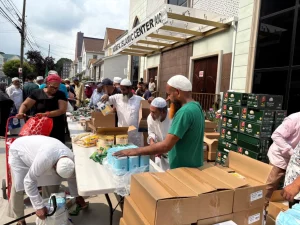July 2025 Impact Report
MSS & Tzu Chi USA Explore Medical Partnership
On July, 2025, Dr. Jahangir Kabir, Director of Operations and Communication at MUNA Social Services (MSS), met with Dr. Freeman of the Tzu Chi USA Foundation to discuss a new collaboration focused on bringing vital medical services to underserved communities in New York City.
The conversation centered around expanding access to free or low-cost health services for MSS clients, particularly in the South Bronx, where many residents face barriers to basic care. Both organizations expressed strong alignment in their missions of service and compassion, and agreed to explore hosting eye and dental clinics to meet urgent community needs.
The potential partnership represents a shared commitment to health equity and community wellness, combining MSS’s grassroots presence with Tzu Chi’s well-established track record in medical outreach.
“Collaborations like this allow us to meet people where they are — with care, dignity, and purpose,” said Dr. Kabir. “We’re excited about the possibilities this partnership could bring to our clients.”
As planning moves forward, MSS will continue to engage with local partners and health professionals to ensure these services reach those who need them most.
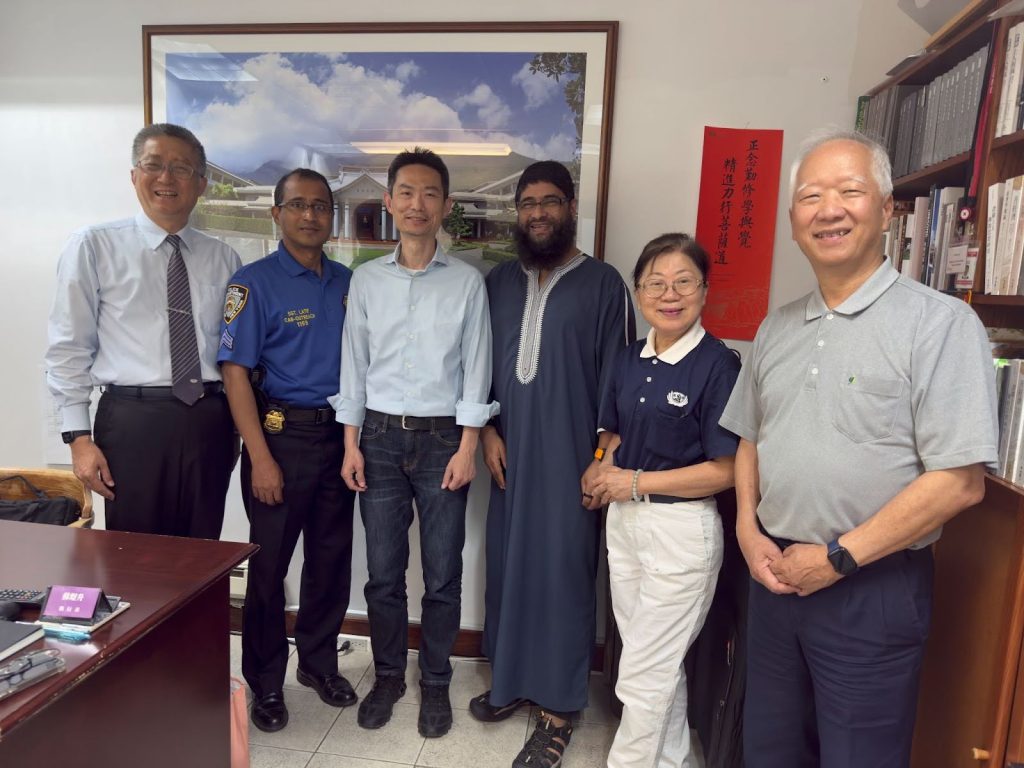
Building Bridges for Community Support: Meeting with Council Member Rita Joseph
On July 15, 2025, Dr. Jahangir Kabir, Director of Operations and Communication at MUNA Social Services (MSS), met with New York City Council Member Rita Joseph at the Brooklyn Islamic Center to discuss expanding essential services within her district.
The meeting focused on potential collaborations between MSS and the Council Member’s office, including the launch of afterschool academic enrichment programs, a targeted SHSAT preparation course to support middle school students, and the distribution of emergency food assistance to families in need.
Council Member Joseph expressed strong support for the work MSS has been doing across Brooklyn and reaffirmed her commitment to strengthening access to youth development and family support services in her district. She shared her enthusiasm for bringing these impactful programs closer to constituents, particularly in underserved communities.
“It was a productive and encouraging conversation,” said Dr. Kabir. “We’re grateful for Council Member Joseph’s willingness to work together toward shared goals of education, empowerment, and equity.”
This meeting marks an important step toward expanding MSS programming deeper into Central Brooklyn, and reflects our broader mission of working hand-in-hand with public leaders and local institutions to uplift communities with dignity and compassion.

Professional Development Spotlight: Teacher Training with Br. Michael Abraham
On Wednesday, July 23, 2025, Aim High Academy – East New York hosted an in-depth professional development session led by Br. Michael Abraham, founder of Abraham Educational Services and a respected voice in the field of culturally responsive education. This training was part of our ongoing commitment to ensuring that Aim High educators and mentors are equipped not only with academic tools, but with the interpersonal and social-emotional strategies needed to serve our students holistically.
Br. Michael holds a Master’s Degree in Education from the University of Minnesota and brings over a decade of classroom and coaching experience, particularly in urban and high-need school environments. His work focuses on equity-centered teaching practices, trauma-informed behavior management, and creating strong teacher-student relationships rooted in empathy and accountability. His past partnerships include both public and Islamic schools across the U.S., and his workshops are widely praised for their practicality and deep insight.
During the session, educators explored real-world strategies for addressing common challenges in the classroom—such as student disengagement, behavioral triggers, and maintaining high expectations while remaining compassionate. The training emphasized the importance of consistency, relationship-building, and cultural relevance, especially when working with students from historically marginalized backgrounds.
“Br. Michael reminded us that our job isn’t just to teach content — it’s to see and affirm the whole student,” one mentor reflected. “This training gave us practical tools to show up better for our students every single day.”
Sessions like this are a vital part of the Aim High model, where academic support goes hand-in-hand with emotional care and strong mentorship. We’re thankful to Br. Michael for sharing his time, energy, and expertise with our staff — and we look forward to continuing to invest in the development of our educators as the new school year approaches.
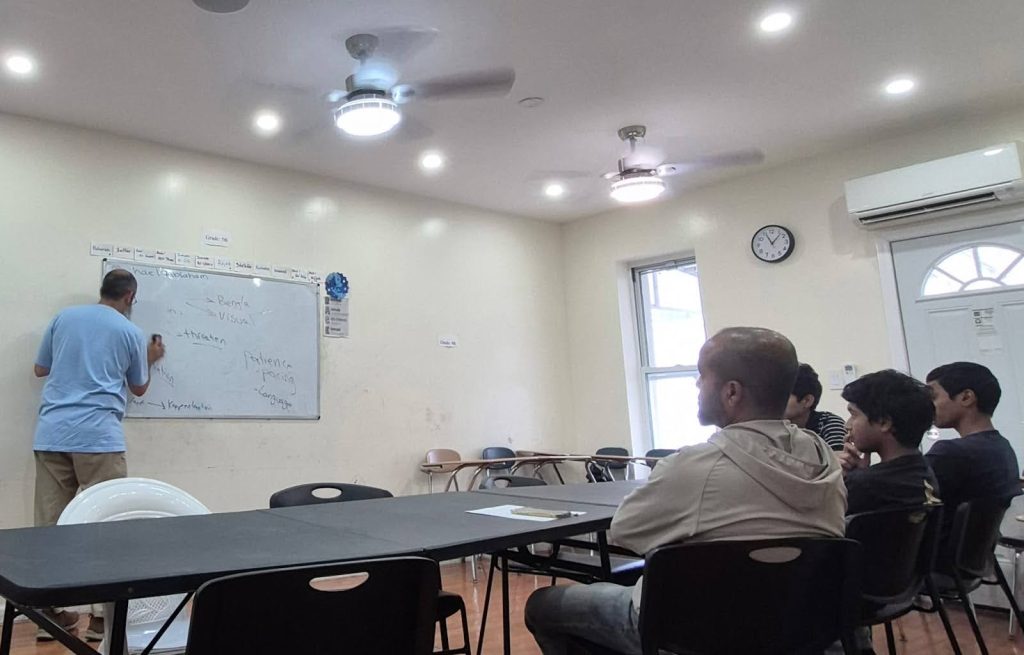
SHSAT Prep at Aim High Academy
At the heart of Aim High Academy is a simple but powerful mission: to give every student a fair shot at academic success—especially when it comes to the competitive and often unequal process of specialized high school admissions in New York City.
This summer, Aim High Academy expanded its Specialized High School Admissions Test (SHSAT) preparation program, providing rigorous, culturally responsive instruction in both English Language Arts and Mathematics. Students meet weekly to strengthen critical thinking, master complex question types, and build the confidence needed to tackle one of NYC’s most challenging exams.
Many students in the program come from neighborhoods where access to high-quality SHSAT prep is limited or entirely out of reach. Aim High fills that gap by offering instruction led by dedicated mentors, practice exams modeled after the real test, and one-on-one support that meets students where they are.
“Before I joined Aim High, I didn’t even know what the SHSAT was,” shared Mohammed Munaem., an 8th-grade student in the program. “Now I feel confident walking into the test, and I actually believe I can get into one of the top schools.”
Abdul Jabbar, Director of Education, emphasized the broader impact of the program:
“This isn’t just about getting a good score—it’s about opening doors. Our goal is to prepare students academically while helping them envision a future full of opportunity.”
As we look toward the fall testing season, Aim High Academy remains committed to leveling the playing field for students across New York City, one prep session at a time.

Senior Connection: Honoring Our Elders with Care and Compassion
This July, MUNA Social Services continued to strengthen its commitment to our elders through the Senior Connection program—an initiative designed to uplift, engage, and support seniors in our community with dignity and respect.
Through a combination of wellness check-ins, food support, and personal outreach, MSS served over 50 seniors across Brooklyn during the month of July. Each senior received a carefully prepared food bag containing nutritious, culturally familiar groceries, pantry staples, and hygiene essentials — all hand-delivered by our dedicated volunteers and staff. For many of our elders, these deliveries offered more than just sustenance; they provided a sense of connection, security, and belonging.
“It’s not just the food,” shared Br. Kareem, a longtime MSS client. “It’s the fact that someone checks on us, talks to us, and truly cares. That means everything at this stage of life.”
MSS has made it a priority to go beyond basic support by fostering strong, compassionate relationships with seniors who are often left isolated. The Senior Connection program ensures they receive not only physical aid but emotional care through consistent, meaningful engagement.
“Serving our seniors is a priority, not an afterthought,” said Safayet Safa, Executive Director of MSS. “They are the backbone of our communities. Through Senior Connection, we’re ensuring they age with dignity, comfort, and consistent support.”
Looking ahead, MSS is committed to growing the program to include health screenings, social activities, and broader wraparound services—ensuring our elders remain supported, seen, and celebrated every step of the way.
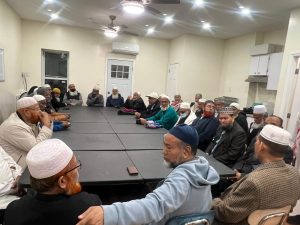
Community Help Center: One-Stop Support for Everyday Needs
The Community Help Center at MUNA Social Services continues to serve as a vital hub for individuals and families navigating public services, applications, and life transitions. Throughout July 2025, the Help Center provided personalized, hands-on assistance to dozens of clients—ensuring no one is left behind when it comes to accessing the resources they need and deserve.
Our team helped community members successfully complete:
4 medical insurance applications, including families in urgent need of health coverage
3 out of 4 SNAP (food stamp) applications, all for eligible U.S. citizens
5 DMV appointments scheduled for driver’s license and ID services
2 Social Security appointments, helping elders and disabled clients apply for benefits
2 resume builds and 1 job assistance case, empowering clients seeking employment
1 green card application, guiding a resident through a complex immigration process
1 Lifeline (free phone) application, ensuring essential communication access
2 Bangladeshi passport applications, assisting with dual nationality paperwork
“Our goal is to make these complex systems feel more human and accessible,” said Mohammed Rahman, Director of the Community Help Center. “We don’t just fill out forms — we listen, we support, and we stand beside our clients until their needs are met.”
The Community Help Center often becomes a lifeline for those overwhelmed by bureaucracy or language barriers. Whether it’s a mother applying for food assistance or an elder needing medical coverage, the center delivers compassionate, multilingual, and culturally responsive service — all free of charge.
“I came in not knowing where to start,” shared Brother Shahid, a father who received help applying for medical insurance for her children. “But they treated me with kindness and explained everything. Now I feel more secure knowing my kids are covered.”
Below is a photo of a family receiving help with their medical insurance application. Their relief and gratitude speak volumes about the importance of everyday support in building stability and trust.
As demand continues to grow, MSS remains committed to expanding this critical service so every individual—regardless of their background—can access the tools they need to move forward.
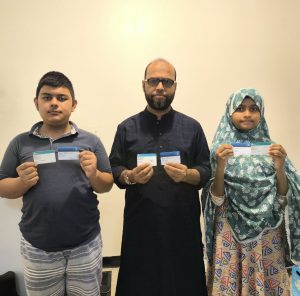
The Dire State of Hunger in New York City:
MSS Distributes Over 400,000 Pounds of Food to 25,000+ People in July 2025
In a time when food insecurity continues to impact countless families, the Nourish Emergency Food Assistance Program (NEFAP) remains one of MUNA Social Services’ most impactful lifelines. Operating through a network of 32 active food pantries across New York, New Jersey, and Delaware, Nourish has become a trusted source of stability for thousands of individuals and households.
In July 2025 alone, the program served over 25,000 people and distributed approximately 400,000 pounds of fresh and nutritious food, including rice, lentils, halal meats, fresh produce, cooking oil, and pantry staples. These food boxes reflect not just quantity, but culturally and religiously appropriate choices—ensuring families receive food they recognize, need, and can use with dignity.
The Nourish Program is more than just a food line—it’s a bridge to hope and resilience. Families who visit our pantries often express deep appreciation for both the support and the warmth with which they’re welcomed.
“I come here every month for food for my kids,” shared Farhana M., a single mother of three. “It’s not just what’s in the bag—it’s how they treat you. They make you feel like family, not charity.”
Behind the success of Nourish is a dedicated team of volunteers, logistics coordinators, and community leaders working to ensure the system runs smoothly week after week.
“This program reflects the heart of who we are,” said Dr. Jahangir Kabir, Director of Operations and Communication at MSS. “To serve 25,000 people in just one month is a testament to the trust communities have in us—and to the urgency of the need. Nourish is about feeding not just bodies, but dignity and community spirit.”
As demand continues to rise, MSS is actively working to expand its capacity, build stronger supply chains, and deepen partnerships with mosques, community centers, and locals. The mission is clear: no one should go hungry.
